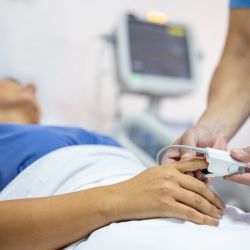A meta-analysis of reports on more than 4000 patients shows that almost one in three people discharged from ICUs has clinically important and persistent symptoms of depression. The research from Johns Hopkins Medicine is published in Critical Care Medicine.
This is a serious issue since more than 5 million people in the U.S. are admitted to ICUs each year. For the purpose of this analysis, the investigators focused on 42 reports composed of 4113 patients who were assessed for depressive symptoms between one and 12 months after discharge from the ICU. Depressive symptoms were measured using the Hospital Anxiety and Depression Scale (HADS-D) which determines the level of depressive symptoms based on a score of 0 to 21 where 0 to 7 is considered normal, 8 to 10 is mild and 11 or greater is considered to be moderate to severe. The investigators then combined the data from the studies, accounted for variation in seven different measures of depressive symptoms used and created a pooled prevalence statistic.
The analysis suggests that depressive symptoms are more likely to occur in patients who have a history of psychological distress. In some patients, these symptoms can last for a year or more. The psychological symptoms that occur before and after an ICU stay and the psychological distress that is experienced during hospitalisation or ICU stay were risk factors that are more associated with depressive symptoms after hospital discharge.
Prevalence of depressive symptoms across all studies ranged from 4 to 64 percent. Mild depressive symptoms were observed in 29 percent of the study patients two to three months after discharge, 34 percent six months after dischrage and 29 percent 12-14 months after discharge. Moderate to severe symptoms were present in 17 percent of patients 2 to 3 months after discharge, 17 percent six months after discharge and 13 percent 12 to 14 months after discharge.
Patients with psychological symptoms already before ICU stay were found to be at greater risk of developing depressive symptoms after ICU discharge. Similarly, those presenting psychological distress symptoms during ICU stay such as anger, nervousness and acute stress symptoms were also at a higher risk.
Study co-author O. Joseph Bienvenu, MD, PhD, associate professor of psychiatry and behavioral sciences at the Johns Hopkins University School of Medicine explains that people with depression not only have slower recovery but alos experience financial strain as they are unable to return to work and need their caregivers to stay home with them as well.
"If patients are talking about the ICU being stressful, or they're having unusual memories or feeling down in the dumps, we should take that seriously. Health care providers, family members and caregivers should pay attention to those symptoms and make sure they're not glossed over," says senior study author Dale Needham, MD, professor of medicine at the Johns Hopkins University School of Medicine.
Source: Critical Care Medicine
Image Credit: Flickr
Latest Articles
ICU, depression, psychological distress, depressive symptoms
A meta-analysis of reports on more than 4000 patients shows that almost one in three people discharged from ICUs has clinically important and persistent symptoms of depression. The research from Johns Hopkins Medicine is published in Critical Care Medicin























